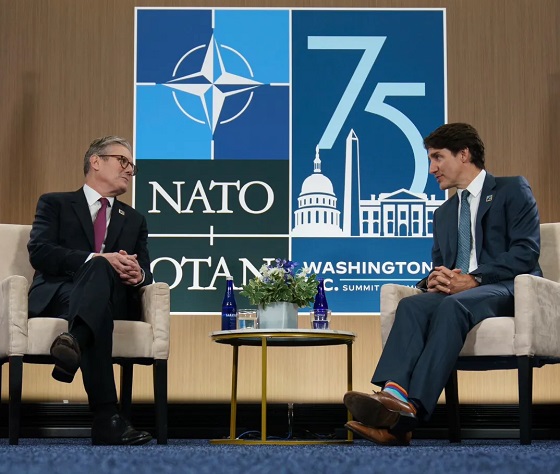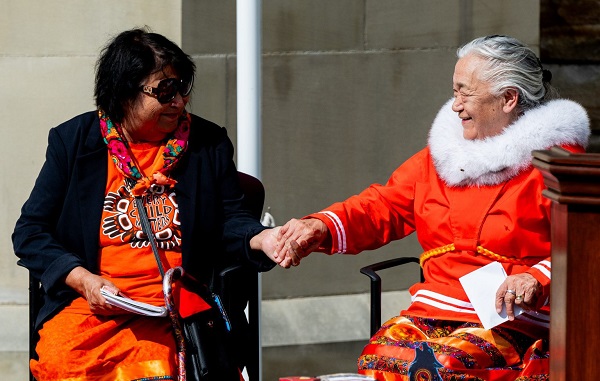Business
Canada offering 12 months of income to LGBT ‘refugees’

From LifeSiteNews
Canada’s Liberal government is giving a year’s worth of taxpayer-funded income and settlement support to LGBT ‘refugees’ through a government-assisted program.
Canada is now offering 12 months of income for LGBT-identifying refugees moving to Canada.
The Government of Canada, under the Liberal Party, is encouraging “LGBTQI+” refugees to move to Canada by offering them taxpayer-funded income for up to 12 months in addition to various other programs.
“The UNHCR, Rainbow Railroad and other referral organizations can identify and refer LGBTQI+ refugees to be resettled under the Government-Assisted Refugees Program,” the government webpage read.
“Refugees resettled under this program get 12 months of income and settlement support through the Resettlement Assistance Program,” it continued.
The program also offers financial aid and incentives through private sponsorships. Canada also renewed their partnership with the Rainbow Refugee Society until the end of 2029.
Under the program, Canadian taxpayers pay for the first three months of income and private sponsors pay the remaining nine months.
“We encourage refugee sponsorship organizations, as well as organizations across the country that support two‑spirit, lesbian, gay, bisexual, transgender, queer, intersex and additional sexually and gender diverse (2SLGBTQI+) people to privately sponsor refugees who face violence and persecution,” the Liberals wrote. “This includes those persecuted based on SOGIESC.”
This is not the first time that Liberals have promoted immigrating to Canada to LGBT individuals.
As LifeSiteNews previously reported, this spring, posters funded by the federal government appeared across Vancouver Island, British Columbia, encouraging mass migration of immigrants who embody LGBT values.
Many Canadians have responded to the refugee program, condemning spending their taxpayer dollars to bring in LGBT activists.
“As a hard working Canadian all my life, paying my taxes and contributing to our health care system, it makes me sad and angry that we are just giving it all away,” one wrote.
“Sounds like they’re buying more liberal votes,” another commented.
“All this while thousands wait endlessly for vaccine injury compensation that was supposed to be given,” another declared.
Indeed, while thousands of Canadians are waiting for vaccine injury compensation and even to receive basic health care, the Liberal government is throwing taxpayer dollars at LGBT groups.
In June, Prime Minister Mark Carney promised $1.5 million in taxpayer funds for LGBT “pride” parades.
Business
Carney’s Bungling of the Tariff Issue Requires a Reset in Canada’s Approach to Trump

Rank and file Americans are best positioned to insist upon a relaxation of Mr. Trump’s tariff policies – that populist base which Mr. Carney neither understands nor respects but whom the President cannot afford to ignore or alienate if he wishes to retain their political support.
By now it is becoming apparent that Mark Carney’s government is seriously bungling Canada’s response to U.S. President Donald Trump’s tariff initiatives. By ill-advisedly imposing counter-tariffs only to withdraw them later, Ottawa temporarily played with “elbows up” – only to learn that, as in hockey, pursuing such a strategy in the absence of a strong offence simply draws penalties and gives the other side a manpower advantage.
As the list of Mr. Carney’s missteps on the tariff file grows – costing Canadians jobs, incomes, and increases in prices – surely it is becoming clear that a fundamental reset is required in Canada’s approach to Mr. Trump and his tariff initiatives if their negative consequences for both Canada and the U.S. are to be overcome.
So what and where is the reset button that could be pushed to redress those initiatives? Who is in the best position to push it, and when is the best opportunity to do so?
That button is not to be found in Washington or on Wall Street, but rather among those to whom Mr. Trump made a promise – time and time again – namely, the American people. “We’re going to get the prices down. We have to get them down. It’s too much. Groceries, cars, everything. We’re going to get the prices down,” he declared repeatedly throughout the 2024 presidential election campaign.
That was the promise. But the current reality is price increases for Americans on food, energy, furniture, and paper products, as well as projected increases in the cost of homes, industrial structures, and public infrastructure as tariffs on steel, aluminum, softwood lumber and timber take their toll. In other words, the reality is not a decrease but an increase in the cost of living for millions of American consumers and voters.
Who then is best positioned to insist upon a relaxation of Mr. Trump’s tariff policies? Not Mr. Carney and his officials, nor even the traditional Washington influencers, but those rank-and-file Americans comprising the massive populist wave that put Mr. Trump in the White House for a second time – that populist base which Mr. Carney neither understands nor respects but whom the President cannot afford to ignore or alienate if he wishes to retain their political support.
So when will be the first real opportunity for Mr. Trump’s core constituency to speak to him effectively – through their votes – about modifying his approach to tariffs? It will be in the months running up to the midterm congressional elections in November, 2026, in which the 435 seats of the House of Representatives and, more crucially, the 35 seats in the US Senate, will be up for election.
Most of those Republican candidates standing for election will want to be pro-Trump to retain hardcore Republican voters, but they will also want to be anti-tariff to secure the support of voters suffering from tariff-induced price increases. How can they be both? By being fully supportive of Mr. Trump’s war on illegal drugs and migrants, bloated bureaucracies, and the mis-management of government finances, while at the same time campaigning as “tariff modifiers”. By asking voters to send them to Washington to support Mr. Trump but to remove the price-increasing-sting of his tariff policies through the negotiation of “reciprocity agreements” with major US trading partners to achieve that objective – just as former president William McKinley, whom Mr. Trump professes to admire, did many years ago.
The election of just a few tariff-moderating Republicans to the U.S. Senate in 2026, to be present when the tariff bill embodying Mr. Trump’s policies eventually gets to that chamber, will do more to improve tariff-disrupting Canada-U.S. trade relations than the ineffectual efforts of those like Mr. Carney who seek to get to Mr. Trump by traditional elite-to-elite negotiating practices.
Getting to Mr. Trump on the tariff issue through his own populist base raises some obvious questions. Which U.S. states, for example, are experiencing the greatest price increases as a result of the tariff wars, and of those, which offer the greatest opportunities to nominate and elect tariff-modifying Republicans to the Senate? Where in the U.S., at the state or national level, are there the beginnings of a grassroots tariff-modification movement, and how might such a movement be encouraged and supported by Canadians as well as Americans.
Americans of course have a vested interest in securing research-informed answers to such questions. But so do Canadians. More on these questions and answers shortly. They are the keys to achieving the desire of the vast majority of rank and file citizens on both sides of the border for a restoration of amicable economic and social relations between our two countries.
Subscribe to Preston’s Substack.
For the full experience, upgrade your subscription.
Business
Labour disputes loom large over Canadian economy

From the Fraser Institute
By Fred McMahon
With labour disputes on the rise, Team Canada faces our greatest economic challenges in decades. It’s a bad look when team members jump the bench for the walk-out/lock-out penalty box—elbows up on the team, not on the ice.
Economic difficulties have escalated in recent years—miserable productivity growth, COVID and its inflation-drenched recovery, the uninvited U.S. trade war, and a government spending spree that left Canada deeply in debt and exacerbated all other difficulties.
Over the same period, labour disputes grew. Hours lost to disputes have been trending down for decades, but up since 2015. For the nine preceding years, the average hours lost annually was 224,000; for the nine years since, it’s been 190,000, but increasing over the years. In 2016, 74,000 hours were lost compared to 362,900 hours in 2023 and 293,600 last year.
Ironically, work stoppages typically occur only if they can wreck havoc on the Canadian economy. They hit sectors where customers and clients have little or no alternative. When customers have choices, they’ll walk away from a shutdown supplier. That encourages workers and businesses to figure out a solution before a strike.
Disputes in transportation and government services are particularly damaging. When Air Canada grounds flights, people and businesses already have tickets and plans. Options are limited and pricey. There is only one Port of Montreal. If it shuts down, there are no other Ports of Montreal. Cargo diversion is, well, limited and pricey. When government employees go on strike, people can’t turn to another government for service.
In 2023 and 2024, Canada suffered 62 transportation such work stoppages, including at the ports of Montreal and Vancouver, Canada’s two largest railways, and the St. Lawrence Seaway.
More disputes are on the way. Canada Post workers recently walked off the job hours after the federal government announced a major move from door-to-door delivery to community mailboxes. In British Columbia, civil servants are on the picket line. Public service unions are preparing to fight efforts to bring federal finances under control. And Air Canada and its flight attendants are now in arbitration after attendants rejected Air Canada’s most recent offer by 99.1 per cent.
As Keith Creel, CEO of Canadian Pacific Kansas City, wrote: “Canada’s message to the world is not one of efficiency, affordability and reliability. Lately, and repeatedly, it’s been the opposite: Disruptions. Delays. Diversions.” This is not a good for Team Canada when Canada needs new investment and entrepreneurship.
Everyone involved in a labour dispute loses. That means Canada losses. Air Canada says its recent strike, three-days long, cost the company $375 million. Employees and customers lose through foregone pay.
More than half a million passengers were directly affected, piling up the losses. Worse is the ripple affect on those not directly affected. When any part of the transportation network is impaired, business and people suffer. The economy is further damaged as investors become skittish about Canadian uncertainty, exacerbating economic difficulties.
Things may get worse. Canada’s economy is shrinking due to the trade war and our own economic mismanagement. That means there’s less stuff to go around. People’s pay on average has to shrink. The economy is not producing enough for everyone to make up “lost wages.” If all wages go up, the economy doesn’t magically start producing more. Instead, money buys less, inflation grows, economic damage intensifies, and there’s even less stuff to go around.
Resentment deepens as workers fight each other over the limited supply of stuff. Those who win make those who lose pay a disproportionate slice of the cost.
Three ways could eliminate or reduce these costs. One is to end unionization in government and essential services. Let the market decide wages. If pay is too low, employees leave for other opportunities, forcing employers to up pay. Another is to incentivize unions to resolve disputes before strikes, for example, by allowing replacement workers. The third is requiring mandatory arbitration, which has an admirable record in Canada of resolving disputes. Legislation should take into account reasonable complaints, whether employers or workers are favoured, and address them.
If Canada’s employers and unions can’t get their act together, only action will avoid dead-loss damage to the Canadian economy, leaving the rest of us as drive-by victims of labour bickering.
-

 Bruce Dowbiggin21 hours ago
Bruce Dowbiggin21 hours agoElbows Up Part Deux: Liberal Canada Now Riding The Blue Jays
-

 espionage2 days ago
espionage2 days agoStarmer Faces Questions Over Suppressed China Spy Case, Echoing Trudeau’s Beijing Scandals
-

 Crime4 hours ago
Crime4 hours agoThe Bureau Exclusive: Chinese–Mexican Syndicate Shipping Methods Exposed — Vancouver as a Global Meth Hub
-

 Business22 hours ago
Business22 hours agoCarney’s Bungling of the Tariff Issue Requires a Reset in Canada’s Approach to Trump
-

 International21 hours ago
International21 hours agoNegotiations continue in Israel-Hamas peace deal
-

 Automotive2 days ago
Automotive2 days agoBig Auto Wants Your Data. Trump and Congress Aren’t Having It.
-

 Business1 day ago
Business1 day agoDaily Caller EXCLUSIVE: Chinese Gov’t-Tied Network Training Illegal Immigrants To Drive Big Rigs In US
-

 Energy1 day ago
Energy1 day agoOttawa must eliminate harmful regulations to spur private investment in pipelines








